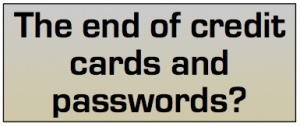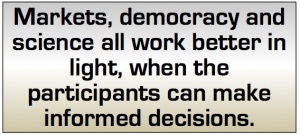Another level of chaos has come to us through the use of credit cards on the Net, linked to our digital IDs. At first, everything was great: the system worked, fraud was present but offset by fees, and the world had a new payments system. That was yesterday. Today, ID theft and card fraud are apparently out of control....
Not long ago, I was told by a gas pump to check with personnel inside; I had driven my little sports car too quickly from the last gas station, and the system had rejected my card because it didn't think I could be me. Soon after that, the anti-fraud system on a different card allowed me to fly to Washington, DC, and charge something there, but not to charge something in New York, where I often travel. When I called the issuing bank, the implication was that I had failed the burden of duty of calling to inform the card company.
I am used to informing these folks when I travel internationally, but - "Do you mean I now have to call you every time I move from state to state?" I asked. "Because I am definitely going to shred the card before that ever happens."
A friend reported having had her card fraudulently used, so she canceled it and had another issued from the same New York bank. That, too, came back soon with fraudulent charges. My response: she wasn't a victim of ID theft; she was a victim of a bank that was lying to her about having been penetrated, with the thief getting card data access. Someone else at the table had also had bad charges on a card from the same bank.
"Simple," I suggested. "Don't change cards; change banks." Can a whole bank be neutralized by a single attacker? You bet.
Scary stuff from a fellow who knows. But nothing compared to other items in Mark's highly respected newsletter: like when he gives us all chills, explaining about the back doors that have been designed into most chips originating in Taiwan, allowing outsiders who have a secret key to simply walk into your system. Those chips are everywhere, including all U.S. defense machinery. Now what could those back doors be for?
== The end of credit cards and passwords? ==
Mark Anderson paints a daunting picture of our future Internet, fraught with viruses, worms, moles, backdoors and a bestiary of other ways that our secrets -- from passwords to credit cards to life histories -- can and will be betrayed. The "cypherpunk" dream is to prevent all of this by encrypting everything behind layers of shrouds -- the biological analogue: fighting viruses by thickening your cell walls and making them less permeable. One can only take that so far before the cells become incapable of interacting with each other. And then die.
Despite an admitted romantic allure, such cypher methods can never be verified, they defy auditing, and they can be suborned or backdoor penetrated by elites. Indeed, the system's opacity makes it hard to detect or repair mistakes. All of which I detailed in The Transparent Society: Will Technology Force us to choose between Privacy and Freedom?
Face it, we in the Western Enlightenment will never excel at skulking and shrouds and games of deceit. Oh, I'm sure our paid protectors have done many clever things: perhaps those "backdoors" that exist in Taiwanese chips and codes contain DOUBLE back doors, that were counter-scammed by the NSA. Our spymasters doubtless have many layers and ingenious processes afoot... and so do some of the "anonymous" hackers... and it will all be for naught over the long run, as education and sheer numbers bring our adversaries (national, corporate, criminal etc) into greater technological parity. At which point their cultural comfort with such cryptic games will turn to their advantage.
As I've sad in places like The Transparent Society, there is another way. We in the Western Enlightenment have a tool that suits our cultural leanings, our talents and our creative bent. That tool is light... openness. The transparency that for 200 years turned competition into the greatest creative force ever seen. Markets, democracy and science all work better in light, when the participants (voters, customers, researchers) can make informed- Hayekian decisions. These arenas clog, choke and start to die when secrecy reigns.
I'm not proclaiming we should drop all efforts in the skulking war of worms and counter worms. In fact, the looming failure of password-based systems (credit cards etc) can be solved with new, transparency-based methods. Google plans to emphasize the obvious - biomentrics - but there are other techniques even simpler and great business models that could be built from them.
This cyber-era replicates a billion years of evolution, when parasites ravaged, then reached balance with the immune systems of metazoan life forms. We are replicating all of that in a few dozen years, praying we can fine tune our info-immune systems in time. Fine, let's invest.
But over the long run, what ambient conditions favor our kind of society? A future that grows steadily less secret and more light-filled is the only one that inherently advantages the Enlightenment West, whose very name contains the key ingredient. All of our adversaries are allergic to such conditions. In an open world, they will have to become more like us, not less.
 Another level of chaos has come to us through the use of credit cards on the Net, linked to our digital IDs. At first, everything was great: the system worked, fraud was present but offset by fees, and the world had a new payments system. That was yesterday. Today, ID theft and card fraud are apparently out of control....
Another level of chaos has come to us through the use of credit cards on the Net, linked to our digital IDs. At first, everything was great: the system worked, fraud was present but offset by fees, and the world had a new payments system. That was yesterday. Today, ID theft and card fraud are apparently out of control.... A friend reported having had her card fraudulently used, so she canceled it and had another issued from the same New York bank. That, too, came back soon with fraudulent charges. My response: she wasn't a victim of ID theft; she was a victim of a bank that was lying to her about having been penetrated, with the thief getting card data access. Someone else at the table had also had bad charges on a card from the same bank.
A friend reported having had her card fraudulently used, so she canceled it and had another issued from the same New York bank. That, too, came back soon with fraudulent charges. My response: she wasn't a victim of ID theft; she was a victim of a bank that was lying to her about having been penetrated, with the thief getting card data access. Someone else at the table had also had bad charges on a card from the same bank.
